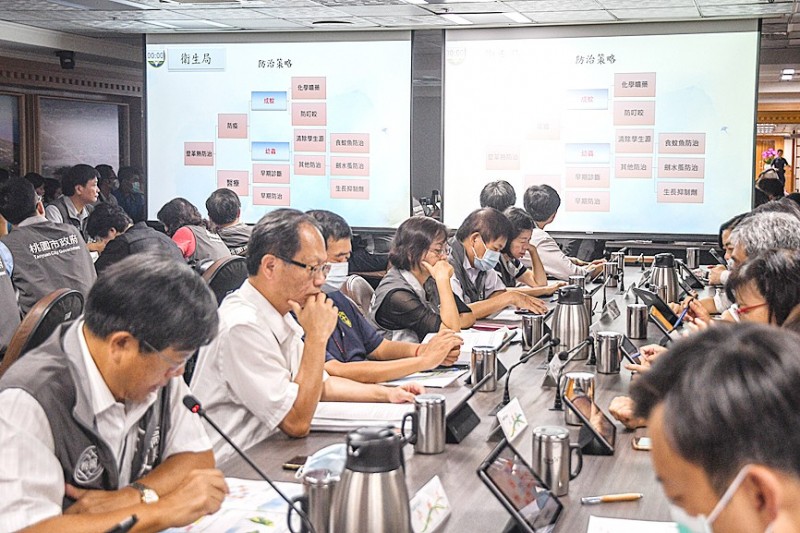《TAIPEI TIMES》 Border controls to stay for now, CECC says

Taoyuan City Government officials yesterday attend a meeting to discuss Taiwan’s COVID-19 situation and disease control strategies. Photo: CNA
WORSENING: The CECC head acknowledged a ‘tidal wave’ of COVID-19 infections affecting nearby countries, urging Taiwanese to practice protective measures
By Lee I-chia / Staff reporter
The Central Epidemic Command Center (CECC) yesterday said that it would not ease border restrictions in the short term, as the COVID-19 pandemic is still in a dangerous situation globally, reiterating that mass testing is not necessary in Taiwan at this time.
Minister of Health and Welfare Chen Shih-chung (陳時中), who heads the center, said that no new cases of COVID-19 were confirmed in the nation yesterday, so the number of confirmed cases remains at 467, of whom 441 have been released from isolated treatment, while 19 remain hospitalized.
As the CECC reported nine imported cases on Monday and Tuesday, Chung Shan Medical University Hospital Pediatric Emergency department director Hsieh Tsung-hsueh (謝宗學) on Tuesday said on Facebook that many in Taiwan are not aware of the “tidal wave” of COVID-19 outbreaks in nearby countries and how they could affect Taiwan.
“There is indeed a ‘tidal wave,’ but it has not struck us yet,” Chen said yesterday, adding that everyone in Taiwan should be aware that the global COVID-19 situation is getting worse, and the number of confirmed cases worldwide has exceeded 16 million, including more than 660,000 deaths.
More than 300 imported cases were reported in Taiwan from the middle of March to early April, but the global COVID-19 situation has worsened since then, so it is inevitable to have some imported, he said.
The CECC would not ease border restrictions in the near term, and would continue to observe the global situation, Chen said, adding that although local communities in Taiwan are relatively safe, everyone should still practice personal protective measures to reduce the risk of local infections to a minimum.
Regarding a Thai migrant worker who tested positive for COVID-19 after returning to Bangkok from Taiwan on Tuesday last week, Chen said the center tested 189 people who have come into close contact with or might have had direct exposure to the man, all of which came out negative.
“The migrant worker tested ‘weak-positive’ for COVID-19, so we have contacted the Thai authority to ask if it would conduct a second test for clarification,” he said.
Centers for Disease Control (CDC) Deputy Director-General Chuang Jen-hsiang (莊人祥), who is also CECC spokesperson, said the man visited a clothing store on July 18 and attended a farewell party on July 19 before returning to Thailand, adding that the local health department would continue to trace his contacts.
Chuang said that the center also identified 43 Thai workers who experienced diarrhea or respiratory symptoms last month and this month, and sought treatment at medical facilities, which 18 Thai colleagues of the infected worker had visited in the past few months, and would ask them to undergo reverse transcription-polymerase chain reaction (RT-PCR) and antibody testing.
While many have suggested that the center conduct mass testing to find potential asymptomatic cases in Taiwan, the current policy of mandatory 14-day isolation or quarantine and an additional seven-day self-health management for all people entering the nation is effective enough, Chen said.
The RT-PCR test is more precise in detecting positive cases, but the timing of the test is also important, as the test might fail to detect infections during the incubation period, he said.
The 14-day isolation or quarantine is necessary, as infected people might develop symptoms and become more detectable through tests during the period, Chen said, adding that in asymptomatic cases the viral load usually falls to a level so low that the patient is unlikely to infect other people after 14 days, Chen said.
He said the current policy puts emphasis on the 14-day isolation or quarantine period to increase testing precision and separate potential infected patients from the local community, but allowing people to return to the local communities after testing negative in mass testing might increase the risk of local infections.
新聞來源:TAIPEI TIMES

















